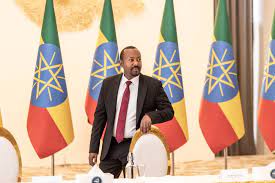

The United Nations Human Rights Council and the European Union Council have jointly called upon Ethiopia to include international components in its transitional justice policy currently under development. In a statement, the UN and EU emphasized the necessity for robust, independent, and impartial mechanisms to implement the policy effectively, urging prompt introduction of implementing legislation.
Forty-four countries, including prominent nations such as the US, UK, Canada, and EU members, have endorsed the joint statement, underscoring the international community’s solidarity in advocating for comprehensive transitional justice measures in Ethiopia.
The UN and EU have been steadfast in pressing the Ethiopian government to allow international scrutiny into human rights violations, particularly those stemming from the conflict in the northern region.
Despite earlier calls for the involvement of the International Commission of Human Rights Experts on Ethiopia (ICHREE), the UN did not extend the Commission’s lifetime following Ethiopia’s request.
Citing allegations of war crimes and crimes against humanity, the UNHCR and EU argue that the gravity of human rights violations in Ethiopia warrants the engagement of international investigative bodies.
Also, the involvement of Eritrean troops in the conflict necessitates international investigation, as emphasized by the international community.
While acknowledging Ethiopia’s initiative to investigate violations through a national transitional justice framework, the UN and EU emphasize the imperative of integrating international expertise into the ongoing policy formulation process.
Ethiopia’s proposed transitional justice policy includes options such as establishing a separate court dedicated to human rights violations or incorporating special court benches within existing judicial systems but the final decision remains pending.
more recommended stories
 Somaliland Pursues Peace: First POW Exchange with Puntland Completed
Somaliland Pursues Peace: First POW Exchange with Puntland CompletedPresident Irro’s Dialogue-Based Approach Gains Momentum.
 From 1960 to Today: Somaliland’s Unbroken Case for Statehood
From 1960 to Today: Somaliland’s Unbroken Case for StatehoodSomaliland’s Foreign Minister Reaffirms Sovereignty, Urges.
 Gogol or Goodbye? Somalia’s Last Opportunity for Federal Reconciliation
Gogol or Goodbye? Somalia’s Last Opportunity for Federal ReconciliationBy Abdirahsid Elmi & Mohamed Musa.
 Somalia’s Secretive Oil Deal with Turkey Sparks Outrage, Deepens Political and Security Concerns
Somalia’s Secretive Oil Deal with Turkey Sparks Outrage, Deepens Political and Security ConcernsMogadishu – Somalia’s parliamentary Natural Resources.

